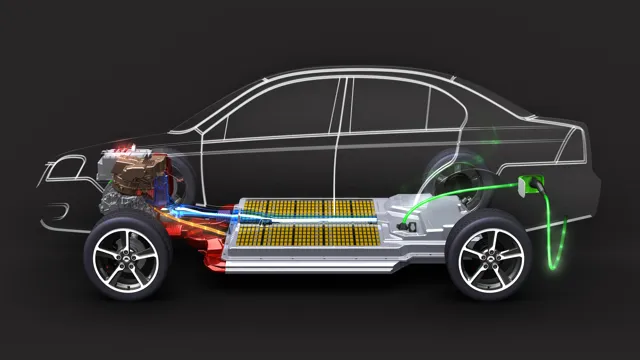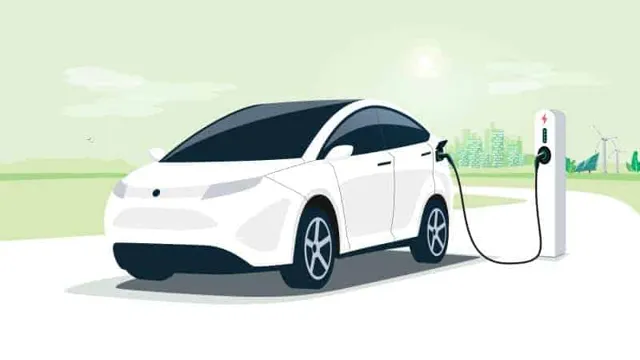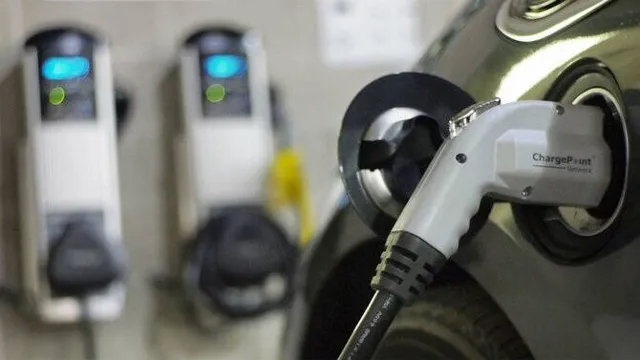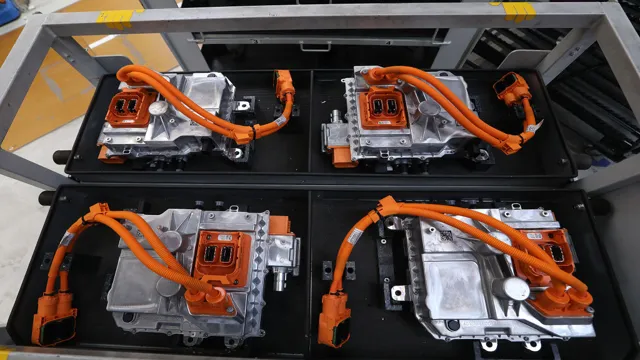Unlocking the Mystery: How Long Does An Electric Car Battery Really Last?
Electric cars have been gaining popularity due to their environmentally friendly nature and cost-saving benefits in the long run. Before making a purchase decision, one important factor to consider is the battery life of the car. The battery is solely responsible for powering the car, so it’s essential to understand how long it will last.
So, how long does an electric car battery last? The answer isn’t a straightforward one, as there are numerous factors that come into play. The battery’s lifespan varies depending on the make and model of the car, the way it’s driven, and how well it’s maintained. It’s similar to how a phone battery life can differ from one another.
However, on average, most electric cars can travel between 150-200 miles on a single charge, and the battery’s life expectancy is between 8-10 years. But there are instances where the battery can last longer or drain faster, depending on how it’s been taken care of. In this blog post, we’ll explore the different factors that can affect an electric car’s battery life.
We’ll also provide you with tips on how to extend the lifespan of the battery and keep it performing optimally. So, buckle up and join us on this ride to unravel the mysteries of electric car batteries.
Overview of Electric Car Batteries
When it comes to electric cars, many people wonder how long the battery can last. The answer to this question depends on several factors, including the battery’s size and capacity, the vehicle’s weight and driving style, weather conditions, and how often the battery is charged. Generally, modern electric car batteries can last for around 100-200 miles on a single charge, but there are exceptions.
For example, some luxury electric cars can travel up to 300 miles on a single charge, while some cheaper electric cars may only last 50-80 miles. It’s worth noting that over time, electric car batteries can decline in performance, so it’s important to take care of them properly. Regular maintenance and avoiding extreme temperatures can help extend the life of the battery and keep it running smoothly for years to come.
Types of Electric Car Batteries
Electric car batteries come in different types, each with its own advantages and disadvantages. The most common type is the Lithium-ion battery. It is widely used due to its high energy density and longer lifespan than other battery types.
Another type of battery technology is Nickel-metal hydride (NiMH) batteries. Although these types of batteries are bulkier, they are less expensive than Lithium-ion batteries and have a lower environmental impact. The third type is Lithium-polymer (LiPo) batteries.
They are much lighter than Lithium-ion batteries and are more malleable, which allows the battery to be shaped in various designs. However, LiPo batteries can have safety issues due to the flammable electrolyte used, and they can have a shorter lifespan. Ultimately, it is important to consider what type of battery is best for your needs and driving habits as different types of batteries have different performances, costs, and charging requirements.

Factors Affecting Battery Life
One of the key elements to consider when purchasing an electric vehicle is the battery life. Electric vehicles are powered by lithium-ion batteries that store and release energy. Lithium-ion batteries are known for their high energy density, which means they can store more energy in a smaller space than other types of batteries.
However, there are several factors that affect the lifespan of these batteries. The main factor is the amount of use the battery gets. Frequent use of the battery can cause it to degrade more quickly.
Additionally, temperature also plays a role in battery life. Extreme temperatures, both hot and cold, can cause the battery to degrade more quickly. Finally, the way the battery is charged can also have an impact on its overall lifespan.
Charging the battery too quickly or too often can result in a shorter lifespan. In summary, it’s important to consider all of these factors when purchasing an electric vehicle to ensure you get the most out of your battery.
How Long Electric Car Batteries Last
Electric car battery life is a common concern amongst new electric car owners. The good news is that electric car batteries are built to last, with an average lifespan of about 8-10 years or around 100,000 miles. However, the lifespan can vary depending on factors such as the make and model of the vehicle, driving style, and frequency of charging.
Some electric car batteries can last even longer, up to 15 years or 150,000 miles. Manufacturers typically offer warranties that guarantee a minimum battery life, with some offering coverage for up to 8 years or 100,000 miles. Remember, regular maintenance and proper care of your electric car battery can help extend its lifespan and performance.
So, don’t let battery life stress you out too much – enjoy the quiet and efficient ride!
Average Battery Life by Model
When it comes to electric cars, one of the biggest concerns that potential buyers have is the lifespan of the battery. The good news is that electric car batteries are built to last. On average, you can expect an electric car battery to last anywhere from 8-10 years, depending on the make and model.
However, it’s important to note that this lifespan can be affected by a variety of factors, including temperature, driving habits, and charging patterns. For example, electric cars that are driven in extreme temperatures, such as very cold or very hot environments, may see a shorter lifespan for their battery. Similarly, heavy acceleration and constant high-speed driving can also reduce battery life.
To get the most out of your electric car battery, it’s important to follow the manufacturer’s recommended charging and maintenance guidelines. By doing so, you can ensure that your electric car battery lasts for as long as possible.
Real-World Battery Life Examples
Electric car batteries have come a long way since their inception, with advancements in technology making them more efficient and long-lasting. But how long can an electric car battery last in real-world scenarios? Well, it all depends on several factors such as driving habits, environmental conditions, and the type of battery in the car. Generally, most electric car batteries are designed to last for between 100,000 to 200,000 miles, but some can last even longer with proper maintenance and care.
Some popular electric cars can go up to 300 miles on one charge, while others can go up to 500 miles. Factors that can affect battery life include extreme temperatures, fast charging, and using the air conditioning or heater excessively. So, if you’re looking to buy an electric car, it’s important to consider your driving habits and the environmental conditions in your area so you can select a battery that suits your needs and demands.
Tips to Extend Battery Life
Electric car batteries have come a long way in recent years, with many models now boasting a range of over 200 miles on a single charge. But how long do these batteries typically last before needing a replacement? The answer varies depending on a number of factors, including how often the car is charged, the temperature it’s exposed to, and how aggressively it’s driven. However, most electric car manufacturers estimate that their batteries will last somewhere between 8 and 10 years, or around 100,000 miles.
It’s worth noting that the battery’s capacity will slowly degrade over time, which means you may need to recharge more frequently as your car ages. To extend the life of your electric car battery, there are a few things you can do. Avoid letting the battery drain completely, as this can cause irreversible damage.
Additionally, try to charge your car when the battery level drops below 50%, as this can help prevent the battery from being exposed to extreme temperatures. Finally, be gentle on the accelerator and brake pedals, as aggressive driving can cause the battery to degrade more quickly. By following these tips, you can help ensure that your electric car battery lasts as long as possible.
Charging Electric Car Batteries
When it comes to electric cars, one of the most common questions that people have is, “How long does the battery last?” The answer to that question depends on a number of factors, including the type of battery, the driving habits of the owner, and how often the car is charged. Generally speaking, most electric car batteries can last anywhere from 100,000 to 200,000 miles before needing to be replaced. However, there are ways to extend the life of your battery, starting with how you charge it.
One important thing to keep in mind is that it’s best to avoid letting your battery get too low before recharging it. In fact, some experts recommend charging your electric car battery when it still has around 20% to 30% of its charge remaining. This helps to prevent what’s known as “deep discharge,” which can cause damage to the battery and shorten its overall lifespan.
Additionally, it’s recommended to use a level 2 charger whenever possible, as this will help to charge your car more quickly and efficiently without putting additional strain on the battery. Overall, if you take good care of your electric car battery and follow some basic charging tips, it should last you for many years to come.
Types of Charging
Charging an electric car battery is not as simple as filling up your gas tank. There are different types of charging, including Level 1, Level 2, and Level 3 (also known as DC fast charging). Level 1 charging uses a standard household outlet and can take up to 24 hours to fully charge an electric car battery.
Level 2 charging uses a 240-volt outlet, like those used for a washer or dryer, and can charge an electric car battery in a few hours. Level 3 charging is the fastest option and uses a high-powered DC charger to charge the battery in 30 minutes or less (depending on the car and charger). It is important to note that not all electric cars can use Level 3 charging and not all charging stations offer this option.
Understanding the different types of charging can help electric car owners plan their charging needs and ensure that they always have enough power for their travels. So, which charging option is the best fit for your electric car? It depends on the make and model of your car, your driving habits, and your charging needs.
Charging Times
Charging times for electric car batteries are a top concern for those considering purchasing an electric vehicle. The charging time depends on the charging station, the electric vehicle model, and the battery capacity. Level 1 charging stations use a regular wall outlet and can take up to 22 hours to fully charge a battery.
Level 2 charging stations require a special charging station and can take anywhere from 4 to 8 hours to fully charge a battery. DC fast charging stations are the fastest and can charge a battery up to 80% in 30 minutes, making them ideal for long trips. It is important to do research on the charging capabilities of the vehicle and the availability of charging stations in the area before purchasing an electric vehicle.
However, as charging technology continues to improve, charging times are expected to decrease, making electric vehicles even more convenient and practical for everyday use.
Conclusion
In conclusion, the lifespan of an electric car battery is not set in stone and can vary depending on various factors such as usage, weather conditions, and maintenance. But have no fear, with the advancement of technology and the increasing demand for eco-friendly transportation, the longevity and efficiency of these batteries will only continue to improve. So, embrace the electric car revolution and enjoy the ride!”
FAQs
What is the typical lifespan of an electric car battery?
The lifespan of an electric car battery varies depending on the make and model, but most electric car batteries have a lifespan of around 100,000 miles or 8-10 years before they need to be replaced.
How long does it take to charge an electric car battery?
The time it takes to charge an electric car battery depends on the size of the battery and the charging station used. On average, it takes about 4-8 hours to fully charge an electric car battery with a standard home charger.
Can an electric car battery be charged while driving?
No, it is not possible to charge an electric car battery while driving using a standard charging system. However, some advanced electric cars may have regenerative braking that recovers energy and charges the battery while driving.
What factors affect the range of an electric car battery?
Several factors affect the range of an electric car battery, including driving style, temperature, terrain, speed, and the use of heating or air conditioning. The estimated range of an electric car battery is generally based on ideal driving conditions.




